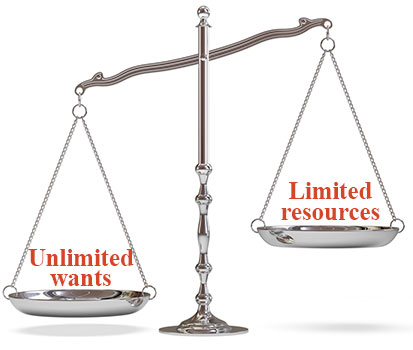Intro
What is Economics?
What is the study of economics?
Economics isn't about money or the stock market. Economics is about the problem of scarcity.
Scarcity is the result of unlimited wants and limited resources. Scarcity, within an economics context, refers to limited resources, not a lack of riches.

If you were to make a list of all of your wants and needs, the list would be very long - possibly endless! Human nature dictates that regardless of how much "stuff" we have, we always want more. It seems humans are never satisfied! Scarcity is a problem that happens because human beings have unlimited wants and needs, but live in a world with limited resources for satisfying those wants and needs.

Because of the problem of scarcity, people - and even entire nations - must make choices about how to allocate limited resources efficiently. Economics is the study of how and why people and nations make those choices.

Marginal
An important term in the field of economics is marginal, which is simply another word for additional. For example, when you see the term marginal benefit being used, you'll know it really means additional benefit.
Likewise:
- When you see the term marginal productivity being used, you'll know it really means additional production from a worker.
- Marginal cost is the additional cost associated with producing an item.
- Marginal revenue is the additional money generated from the sale of an item.
One of the key principles of economics is that rational people think at the margin meaning that decisions focus on the extra benefit and extra cost derived by you, businesses, and nations.